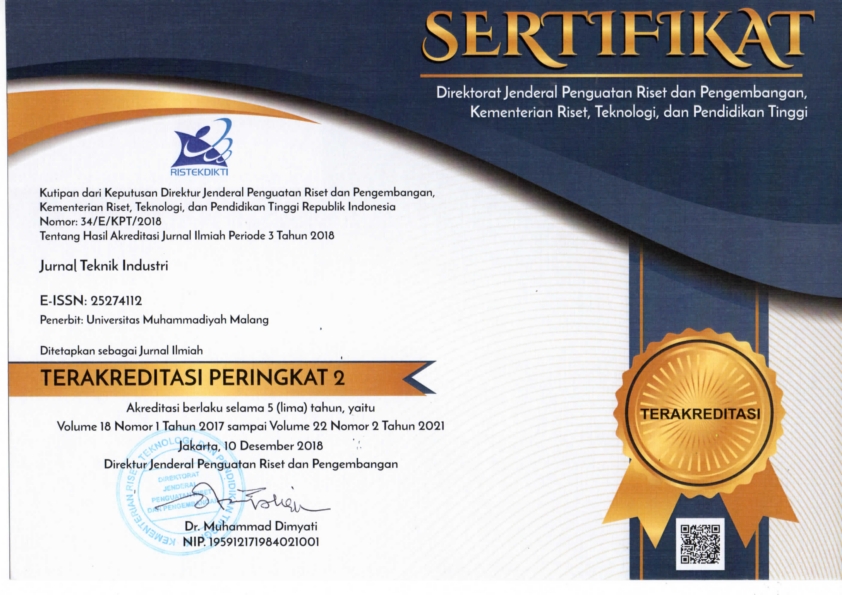Pemodelan Persamaan Struktural : Penerapan Manajemen Pengetahuan Dan Faktor-Faktor Pendukungnya
DOI:
https://doi.org/10.22219/JTIUMM.Vol18.No2.159-167Keywords:
Knowledge management, organization, SEMAbstract
The application of knowledge management in an organization requires the enabler factors that should be identified of its readiness before implementation. This study examined knowledge management implementation model with the variables of organizational leadership, culture, and structure as predictor of technology infrastructure variable. The purpose of this study was to examine the fitness of the proposed model with data in the field, as well as to know the relationship between these factors. Data were collected through questionnaire using likert scale 1-5 on 112 respondents from a manufacturing company in Cilegon, Banten. Modeling was done using residual correlation and regression of knowledge sharing indicators and indicator of knowledge management team function. It showed the appropriate result but not yet reached the expected value of Chi-Square of 73.502 with p = 0.010, GFI = 0.907, RMSEA = 0.069, AGFI = 0.848, and RMR = 0.041. Overall the modified model shows results that match the criteria of Goodness of Fit. The results of model analysis also showed that there was an indirect influence of leadership variables on technology infrastructure, through cultural mediators and organizational structures, but direct influence of the leadership on the technology infrastructure was not explained.
Downloads
References
T. H. Davenport, “Saving IT’s Soul: Human Centered Information Management,” Harv. Bus. Rev., vol. 72, no. 2, pp. 119–131, 1994.
B. Duhon, “It’s All in our Heads,” Inform, vol. 12, no. 8, 1998.
E. Lettieri, F. Borga, and A. Savoldelli, “Knowledge management in non‐profit organizations,” J. Knowl. Manag., vol. 8, no. 6, pp. 16–30, 2004.
A. Heggli, “Knowledge Management in non‐profit organizations, a Case Study in The World Bank,” Uppsala University, Disciplinary Domain of Humanities and Social Sciences, Faculty of Social Sciences, 2011.
P. F. Drukker, “Management and The World’s Work,” Harv. Bus. Rev., 1988.
J. Birkinshaw, “Why is Knowledge Management So Difficult?,” Bus. Strateg. Rev., vol. 12, no. 1, pp. 11–18, 2001.
Y. J. Yeh, S. Q. Lai, and C. T. Ho, “Knowledge management enablers: a case study,” Ind. Manag. Data Syst., vol. 106, no. 6, pp. 793–810, 2006.
B. Lee and H. Choi, “Knowledge Management Enablers, Processes and Organizational Performance: An Integration and Empirical Examination,” J. Manag. Inf. Syst., vol. 20, no. 1, pp. 179–228, 2003.
K. Ichijo, G. Krogh, and I. Nonaka, “Knowledge enablers,” in Knowing in Firms, G. Krogh, J. Roos, and D. Kieine, Eds. California: Sage, 1998, pp. 173–203.
D. S. Elenkov, “Effects of leadership on organizational performance in Russian companies,” vol. 55, pp. 467–480, 2002.
C. O’Dell and J. Grayson, “Knowledge transfer: discover your value proposition,” Strateg. Leadersh., vol. 27, no. 2, pp. 10–15, 1999.
S. O. S. Syed-Ikhsan and F. Rowland, “Knowledge management in public organization: A study on the relationship between organization elements and the performance of knowledge transfer,” J. Knowl. Manag., vol. 8, no. 2, pp. 95–111, 2004.
P. T. B. Ngoc, “An empirical study of knowledge transfer within Vietnam’s information technology companies,” 2005.
F. Mavondo and M. Farell, “Cultural orientation: Its relationship with market orientation, innovation and organization performance,” Manag. Decis., vol. 41, no. 3, pp. 241–249, 2004.
A. H. Gold, A. Malhotra, and A. H. Segars, “Knowledge management: An organizational capabilities perspective,” J. Manag. Inf. Syst., vol. 18, no. 1, pp. 185–214, 2001.
A. Srivastava, K. M. Bartol, and E. A. Locke, “Empowering Leadership in Management Teams: Effects on Knowledge Sharing, Efficacy, And Performance,” Acad. Manag. J., vol. 49, no. 6, pp. 1239–1251, 2006.
A. Widarjono, Analisis Multivariat Terapan dengan Program SPSS, Amos, dan SmartPLS, 2nd ed. UPP STIM YKPN, 2005.











